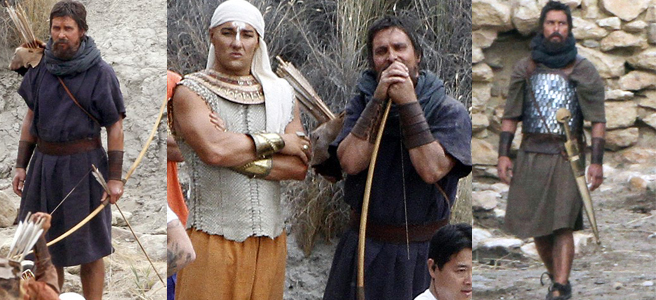An interview about my new novel David Ascendant.
Man, nobody has written a novel like this about King David.
Nobody until now.
An interview about my new novel David Ascendant.
Man, nobody has written a novel like this about King David.
Nobody until now.
Sci-fi Adventure about an astronaut pilot, Cooper, played by Matthew McConaughey, who sets off on a space journey to discover a suitable planet outside our galaxy for the inhabitants of our dying earth to move to. In the process, he encounters other worlds through wormholes, black holes, time travel, and other anomalies of Relativity, all in the quest of returning to his beloved children back on earth to provide them and the human race a better future.
While the film is big, bold and beautiful, and does seek to explore the power of love, it ultimately fails for me and is a disappointment because it creates a false transcendence in a Humanistic feedback loop that simply does not satisfy emotionally, scientifically, or spiritually.
Christopher Nolan is the top director in Hollywood and has a track record of movies with intelligence. One of my favorites of all time is his wrestling with moral values in our postmodern world of The Dark Knight. But Inception began to reveal to me the weakness of too much intellectual exploration of ideas. The movies become more “mental” than emotional and create an alienating feeling in me as the viewer precisely because the emotional threads of the story become mere carriers of the mental construct and end up not ringing as true emotionally or dramatically.
Hmmmm, methinks I may be starting to sound too mental and emotionally detached. But hey, this is a movie analysis, NOT a narrative! J
So let me explain.
 Interstellar is loaded with almost too many intellectual questions related to wormholes, black holes, how Relativity affects our experience of time, 4 dimensional existence versus 5 dimensions, and on. But luckily for us, we have been exposed to all these ideas in sci-fi movies for so long, and there is nothing particularly new in Nolan’s approach other than the attempt to address all of them together. Usually, movies have only enough time to explore one concept such as time travel or the nature of wormholes, etc. Even though Interstellar has almost three hours, the viewer is constantly bombarded with so many concepts that it just becomes overwhelming. That is when it becomes a bit more intellectual than emotional.
Interstellar is loaded with almost too many intellectual questions related to wormholes, black holes, how Relativity affects our experience of time, 4 dimensional existence versus 5 dimensions, and on. But luckily for us, we have been exposed to all these ideas in sci-fi movies for so long, and there is nothing particularly new in Nolan’s approach other than the attempt to address all of them together. Usually, movies have only enough time to explore one concept such as time travel or the nature of wormholes, etc. Even though Interstellar has almost three hours, the viewer is constantly bombarded with so many concepts that it just becomes overwhelming. That is when it becomes a bit more intellectual than emotional.
Ah, but there is plenty of emotion in this story that tries to make up for the intellectualism. Cooper has a deep love for his daughter, and his goal in the movie is to get back to her, thus fulfilling the “family love” necessary to blockbuster movies. And there are moral dilemmas explored such as self sacrifice versus selfishness, as the astronauts encounter choices of the “survival instinct” and the natural preference of family over society. These are all good moral questions to explore, but they sometimes fall into flat exposition scenes that work against the drama. Case in point: One rescued astronaut betrays another and waxes on about his reasons as he walks away. This feels like an artificial morality play more than a real drama. But the truth is, because he is exploring moral questions that I think are worthy, I have a lot of grace for such moralizing.
Nolan sets up a common sci-fi theme of the hard cold observations of science versus the warm emotional reality of humanity and how those two can battle themselves out in our pursuit of understanding the universe and our place in it. Cooper is a man of science who says at the very beginning of the story, the basic slogan of NASA: “We’ve forgotten who we are. We’re explorers and pioneers, not caretakers.” In other words, it is our human reach for the stars that helps us find our way out of the mud.
But one of the astronauts, Amelia (Ann Hathaway) is motivated by her love of a fellow astronaut they are trying to rescue on one of several distant planets. So Cooper tells her that her emotions will cloud her objectivity in making the best decision for humanity in terms of which action they need to take between two choices of who to save. She then responds with the major theme of the movie: “Maybe love is the evidence of an artifact that we cannot see. Love has the ability to transcend time and space.” The meaning here is that our search for meaning through scientific observation may be the cloud that blinds us to finding the true meaning because meaning is transcendent, while our senses are not. Only something like love can make “contact” with meaning outside of physical reality.
Okay, not bad. Except that it’s application to the actual moral choice they must make is completely false and doesn’t ring true. The woman was thinking selfishly of her own love and placing that over the concerns of the survival of the human race. The fact that Nolan can manufacture the right outcome story-wise to justify her sentiments just rings hollow because her moral choice was truly self-serving. She even says, that she “follows her heart,” which is THE single most dominant Hollywood theme and THE worst moral motivation possible in our world of selfish hearts.
But that’s not the worst of it.
The movie becomes emotionally and spiritually unsatisfying and empty when we see the climactic solution to problems as the journey takes us into a black hole.
SPOILER ALERT:
The entire movie has a question at the back of it: Wormholes are not naturally occurring, so someone put it there for the astronauts to go through to find another galaxy to live in. But who are THEY?
Cooper sacrifices himself to save Amelia, and launches himself into the black hole to see what will happen (for science?). It is here that the futility of humanistic philosophy creates a hollow answer in the movie.
The question of extraterrestrial intelligence is an obvious possible answer. But rather than discover aliens as our saviors, Cooper instead concludes with a weird matrix experience in the black hole that “They didn’t bring us here at all. We brought ourselves.” He concludes that somehow humans evolve into 5 dimensions and create the black hole and its ability to travel in time to help them in the past.
It’s all so silly and confusing, and illustrates the futility of humanistic attempts to manufacture transcendence while deny the God of transcendence.
The short of it is that in this movie, there is no real transcendence, and humankind is after a fashion our own creators. That desire to be saved by a higher power outside ourselves and to connect to that personal transcendence usually results in the religion of scientism that saturates so many movies with it’s pursuit of aliens (from Stargate to Contact to Prometheus and on and on). But in this case, there are no aliens, only us. And we are in a time loop creating ourselves after a manner.
And here is where the movie devolves into completely unsatisfying emptiness. Not once in the entire film does anyone ever raise the question of God. Not even to discredit Him. In all this vast and glorious space, in all the wonders of the human mind, no character on the entire planet even considers the hand of a transcendent creator as a possible means of discovering that transcendent truth. It rings so hollow and untruthful because, like Humanism, it seeks to have transcendence without God, and therefore the only transcendence can be in some kind of silly human version of love.
As if the sentiments of human beings that are pathetically contingent and embodied within finite time and space make their own transcendence in a godless universe. This is philosophically and intellectually ridiculous and emotionally, spiritually and dramatically unsatisfying.
How unlike this unsatisfying attempt to create meaning where there is none is the transcendent God of the Bible whose infinite personal love actually is the philosophical, emotional and spiritual grounding to give meaning to our understanding of love, and who is the transcendent ground of all being that gives us meaning.
To tell a story where humanity is its own creator is profoundly foolish on all levels, philosophically, spiritually, and scientifically, no matter how good a filmmaker you are, or how pretty are your special effects.
Dang it. Cause I really respect Christopher Nolan as a filmmaker. But I gotta hand it to him, his stories are a narrative of his own journey of seeking transcendence. The only thing you can find in humanity is the image of the Creator.
I am reminded of what the Psalmist wrote in these deeply satisfying lines about true transcendence…
Psalm 8
O Lord, our Lord,
how majestic is your name in all the earth!
You have set your glory above the heavens.
Out of the mouth of babies and infants,
you have established strength because of your foes,
to still the enemy and the avenger.
When I look at your heavens, the work of your fingers,
the moon and the stars, which you have set in place,
what is man that you are mindful of him,
and the son of man that you care for him?
Yet you have made him a little lower than the heavenly beings
and crowned him with glory and honor.
You have given him dominion over the works of your hands;
you have put all things under his feet,
all sheep and oxen, and also the beasts of the field,
the birds of the heavens, and the fish of the sea,
whatever passes along the paths of the seas.
O Lord, our Lord,
how majestic is your name in all the earth!
Now, THERE’S transcendent love for you.
Check page 60 for the feature on Brian Godawa:
http://www.joomag.com/magazine/christian-review-magazine/M0457831001414699003
Maybe Deliver Us From Evil is just another demon possession movie that’s combined with a cop crime story.
But I doubt it.
Written and Directed by Scott Derrickson, this movie is inspired by the true story of Ralph Sarchie, a New York cop who encountered murders involving demon possession. He joins up with a Roman Catholic exorcist to solve the crimes, and in the process, he rediscovers his lost faith.
Okay, horror is not for everyone. But in this modern world that denies the supernatural, along with God, sometimes the best way to break through the rabid materialistic worldview of our culture is through horror. It’s a kind of apologetic that proves God by proving supernatural evil. If people believe there is a devil, it’s a pretty self-evident corollary that there is a God.
 What I like most about Derrickson’s cinematic portrayal of demon possession (This and The Exorcism of Emily Rose), is his understated realistic approach. He doesn’t rely on special effects gimmicks or make up that are impossible in the real world. The things that happen are mostly the kind of things that really do happen in demon possession cases. So no heads turning around or impossible levitations. Don’t get me wrong, there are contortions, dilated pupils, cuts appearing on bodies, and even preternatural strength and multiple voices. But these are all documented around the world to have occurred in such cases. He doesn’t “Hollywoodize” that stuff to an unbelievable extreme, which is what makes a lot of other demon movies just goofy. I’m not against adding fantasy or beefing it up if you are playing to certain genre demands. I’ve done so myself. But when you are dealing with true stories like Derrickson does, it makes it more scarier to be more realistic.
What I like most about Derrickson’s cinematic portrayal of demon possession (This and The Exorcism of Emily Rose), is his understated realistic approach. He doesn’t rely on special effects gimmicks or make up that are impossible in the real world. The things that happen are mostly the kind of things that really do happen in demon possession cases. So no heads turning around or impossible levitations. Don’t get me wrong, there are contortions, dilated pupils, cuts appearing on bodies, and even preternatural strength and multiple voices. But these are all documented around the world to have occurred in such cases. He doesn’t “Hollywoodize” that stuff to an unbelievable extreme, which is what makes a lot of other demon movies just goofy. I’m not against adding fantasy or beefing it up if you are playing to certain genre demands. I’ve done so myself. But when you are dealing with true stories like Derrickson does, it makes it more scarier to be more realistic.
Now, while I didn’t find this one as scary as say Emily Rose or other demon possession movies like Paranormal Activity or The Last Exorcism, it is still compelling with its share of frights and a couple of eerie shots that make your skin crawl. His demonic “floor scratching” sounds (a common element of the genre) are the scariest I’ve ever heard. Scariness can be a very subjective thing, and the more you’ve seen, the less seems scary. So if you don’t normally watch horror, this will probably be plenty scary.
What I really found fascinating was the priest who teamed up with the cop. The priest, Mendoza, breaks all the stereotypes of priests in movies. He’s young, not old; cool, not archaic, flawed, not holy, forgiven, not judgmental, and best of all, the wise mentor, not the fool. As Sarchie uncovers the spiritual reality behind the murders, he struggles with his own lost faith. But the essence of the spiritual battle is brought out with Christian clarity like I’ve never seen before in a horror movie. In one moment, the priest tells him something like, “You have seen a lot of evil in your job, no doubt. But that is secondary evil. But until you’ve seen primary evil, you do not know true evil.” And of course, demonic evil is primary evil.
 But the priest is not a false holy monk, either. He’s a real sinner, who sinned grievously AS A PRIEST. But what makes this portrayal so different from all the other movies that try to make priests out to be all secret adulterers and child molesters and hypocrites, is that this one shows a priest who confesses that sin and repents and turns back to God. That is grace. That is what the secular world cannot understand. Because Derrickson is a Christian, he can bring that kind of nuance and complexity to a spiritual character as flawed but heroic. This is the director that should be directing the next movie on King David, not another Hollywood secularist trying to subvert a sacred narrative.
But the priest is not a false holy monk, either. He’s a real sinner, who sinned grievously AS A PRIEST. But what makes this portrayal so different from all the other movies that try to make priests out to be all secret adulterers and child molesters and hypocrites, is that this one shows a priest who confesses that sin and repents and turns back to God. That is grace. That is what the secular world cannot understand. Because Derrickson is a Christian, he can bring that kind of nuance and complexity to a spiritual character as flawed but heroic. This is the director that should be directing the next movie on King David, not another Hollywood secularist trying to subvert a sacred narrative.
SPOILER ALERT: The priest explains that the cop must confess his sins because our unrepented sins are the dark secrets that supernatural evil can use against us. Wow. Only when Sarchie confesses his sins, is he “covered” by God’s power. This is all done in the context of Roman Catholicism, where Sarchie confesses to Mendoza, who then says, “I absolve you.” So anti-Catholics will not like this. Those less bothered by theological distortions, will argue that it WAS his experience that is the story, and the principle behind it is true, that confession of sins to God and forgiveness is our redemption and power to fight such primary evil (distortions notwithstanding).
Another problem as I see it with the genre is that demon possession movies all must end with the third act as the Exorcism sequence. This makes it so hard to come up with something new. Cause it’s usually a priest and others in a room repeating the exorcism ritual as the person manifests supernatural reactions. What have we not seen before? Many times movies try to outdo each other with more spectacular effects, but again, Derrickson does not bow to that cheap way out, though he certainly has a few goodies to offer.
Again, they use the Roman Catholic ritual of exorcism. Look, I realize that they do use that in real life, AND I realize it is more cinematic to engage in a ritual that has progression to it. But I’ve always hoped that people don’t think that recounting words like some kind of magic formula is how to fight a demon. In the Bible, it is the faith of the believer and his calling upon JESUS CHRIST to cast the demon out that does it (And this surely does occur at the end of the exorcism in the movie). But I’ve always been amazed at how in the New Testament, casting out demons was a relatively quick procedure, certainly not as dramatic for a movie. They would cast out in the authority of Jesus Christ, and BAM, they left. Now, Jesus does say that there are some tough cases that require prayer and even fasting. So there are more difficult cases to be sure, but it was not the norm in the first century.
I am studying a lot about Jesus’ ministry as an exorcist for my next novel, Jesus Triumphant, so it is going to be quite a challenge. The real question that many believers never explore is: Exactly what are demons? Everyone assumes “fallen angels.” But the Bible does not say that they are fallen angels, it just calls them evil spirits. Where do they come from? There is an interesting option not normally discussed among polite company. I will be dealing with that in a way I have not yet seen done. Unfortunately, you won’t know until next year, cause I have not written the book yet. But you can find out the theology of it all in my book When Giants Were Upon the Earth: The Watchers, The Nephilim, and the Biblical Cosmic War of the Seed, here on Amazon.
You think you know the story of King David.
Wait till you read this.
You can read the controversial first chapters of David Ascendant online here. It’s the subscribe page, find the “Click Here for free David Ascendant chapters” at the bottom.
Then go pre-order it on Kindle here at Amazon.com.
Available in paperback this Saturday, Nov. 1.
I got caught up in the Danish TV Series Borgen (available on Netflix). It’s the story of Birgitte Nyborg, who becomes the Prime Minister of Denmark and how that position of power affects her personal and political life in both positive and negative ways. I tell people it’s like House of Cards, but without murder and cynicism. More like Naïve European Humanism J. In fact, I would have thought I would not like it, because I am usually bored and turned off by political preaching in movies and shows. Not only that, but this is an obvious Feminist AND Socialist narrative! But hey, I’m willing to admit great human drama and storytelling regardless of the agenda. And this is fantastic human drama and storytelling. (But beware, I did warn you)
Of course, they pretend to be “Center” in their depiction by making Birgitte a part of the “Moderates.” Though usually they are not, sometimes they actually are, such as her revelation that pulling out of Afghanistan would only worsen the violence and deaths (something our own king could learn from). One episode, they completely missed their own point when they showed the Prime Minister use private healthcare for her own daughter while hypocritically supporting their socialized system (“We don’t want to be like America”). Why? Because of the ungodly wait in line for rationed healthcare. Duh. Okay for the public, but not for us important lawmakers (I guess they are just like America after all). But she never changed her policy, and that showed that the storytellers wanted to “deal with the issue,” but never faced the consequences of their own argument.
The only thoroughly despicable person in the show, of whom it is assumed you can NEVER compromise with, is the leader of the Freedom Party, who is depicted in the worst stereotype of being a fat obnoxious pig with bad teeth. Can you guess what side the Freedom Party represents? No-brainer: The Far Right. Also, the show is very Politically Correct in that they never dealt with the raving Islamism problem in any of their episodes.
 One particularly repugnant moment of anti-Christian prejudice in the show was on an episode about two African parties at war over their country— actually, more like an Islamic party killing Christians who start to protect themselves, which is the actual scenario in Africa. Anyway, in order to make both sides have a negative aspect to them, the storytellers chose to have the Christian look all nice, but then have as his uncompromising agenda that the only ones who should not have rights in their country are homosexuals. And then he says “We have no homosexuals here” with a smile, thus revealing an oppression in denial. The tragic irony is that very statement in our real world came not from a Christian, but from Ahmadinejad, the head of an ISLAMIC country, Iran. So putting Islamic oppression into the character of a Christian is despicably dishonest and Christophobic. But that’s what you get from secular bigots.
One particularly repugnant moment of anti-Christian prejudice in the show was on an episode about two African parties at war over their country— actually, more like an Islamic party killing Christians who start to protect themselves, which is the actual scenario in Africa. Anyway, in order to make both sides have a negative aspect to them, the storytellers chose to have the Christian look all nice, but then have as his uncompromising agenda that the only ones who should not have rights in their country are homosexuals. And then he says “We have no homosexuals here” with a smile, thus revealing an oppression in denial. The tragic irony is that very statement in our real world came not from a Christian, but from Ahmadinejad, the head of an ISLAMIC country, Iran. So putting Islamic oppression into the character of a Christian is despicably dishonest and Christophobic. But that’s what you get from secular bigots.
Sorry, I had to get my rants about some of the political BS first.
The morality of the show is also very European and sadly alienating. Family is the least important of values to these people. But there is a bright shining ray of an adulterer who returns to his family, so it is not cynical. I think they were just depicting their reality, and the Danes accept it because of their godlessness. They don’t know any better, the poor secular socialists.
All that said, you might think I hate the show. But I don’t. Surprise, surprise. Why? Because the human drama and relationships are riveting with pathos. And watching Danish politics, as different from American politics as it is, is fascinating. It is well written, brilliantly cast, brilliantly acted, brilliantly directed. All human beings, regardless of their worldview leak God’s image through their work in the snippets of human truth they capture. For instance, there is a kind of moral lesson to observing the anatomy of the breakdown of a family in a tragic kind of way, even if these storytellers consider it acceptable “collateral damage” for Feminist victories and the great teat-sucking socialist state. We see Birgitte seeking to “do good” for her country, while she loses her marriage and family. In fact, the same thing happens to those in the newsroom covering the politics 24/7.
Also, there is a kind of realpolitik of compromise in that country because of their multiple parties that force them to negotiate in a way that American politics does not. Yet, even here, I found it ironic that the very thing that the politicians wanted, compromise, was NOT what the electorate wanted, because the thing that made Birgitte such a populist hero was precisely her standing out from the crowd by not playing the game and sticking to her uncompromising convictions. Hmmmmm. Maybe we’re not all that different. It’s a fair depiction of seeking to balance convictions with the reality of governing with people with whom you disagree. As Birgitte says to one of the radical Greens who challenge her, “You are the leader of the Green Party. I am the Prime Minister of a country that includes those who disagree with me.” Humans everywhere make backroom deals and negotiate for personal reasons as much as public ones.
KIND OF SPOILER ALERT: Anyway, the real reason that inspired this post was that the show is godless. God is nowhere to be found in this Danish story and their characters lives. It is quite empty. But near the very end of the last season, the heroine Birgitte discovers she may have breast cancer (Don’t worry, I won’t tell you if she does or if she does not and how it plays out).
 I just thought, that this scene of how she responds to the news was the most profound moment of the entire show, because it showed the real despair that atheist pursuers of “meaning” and “good” should really face about their delusions in light of the implications of their own worldview. It was like one spiritual glimpse behind the curtain of a very secular humanistic story. A shred of honesty in a godless world of self-deception. (I do not think the storytellers are intending a Judeo-Christian worldview in this revelation, because the whole of the show goes against it. I just think that even atheists can have a moment of honesty if they want to tell a good story).
I just thought, that this scene of how she responds to the news was the most profound moment of the entire show, because it showed the real despair that atheist pursuers of “meaning” and “good” should really face about their delusions in light of the implications of their own worldview. It was like one spiritual glimpse behind the curtain of a very secular humanistic story. A shred of honesty in a godless world of self-deception. (I do not think the storytellers are intending a Judeo-Christian worldview in this revelation, because the whole of the show goes against it. I just think that even atheists can have a moment of honesty if they want to tell a good story).
Of course, you won’t get the full impact if you haven’t lived with this character and with her victories and defeats, her gains and her losses, but I hope you can still pick it up. And don’t be fooled by vague references to prayer in the clip, that was just a colloquial blurt. It is more a metaphor for fate without a god, because there has been no spirituality the entire show.
Enjoy a rare moment of honesty from an atheist worldview…
Okay, so I’m thinking, Steve Zaillian writing and Ridley Scott directing the new movie Exodus: Gods and Kings means that, though they are both agnostics or atheists, they are at least great storytellers who make movies that people actually see. You know, as in good stories. Maybe, just maybe, they won’t screw it up like Aronofsky did with Noah. The trailer already looks very cool showing some of the Ten Plagues.
But then again there was that “trick the Christians” Noah trailer…
Look, I’m not talking about ridiculous fundamentalist demands to reproduce the story as the Gospel according to the Ten Commandments starring Charlton Heston. That movie had tons of flaws to it and departed from the Bible at key points, yet religious movie watchers still loved it because it didn’t depart from the Biblical themes.
I am talking about the subversion of Judeo-Christian heroes and their stories with a secular agenda. I hope it’s not happening again.
Here is the Christian Bale quote about Moses from Christianity Today online:
“I think the man was likely schizophrenic and was one of the most barbaric individuals that I ever read about in my life,” the forty-year-old star said. “He’s a very troubled and tumultuous man who fought greatly against God, against his calling.”
Look, Bible heroes are NOT perfect sinless creatures. Only Jesus fits that bill. Yes, Moses murdered a man, and he had a character arc that went from being adopted and raised as a pagan Egyptian to a conversion to his troubled and tumultuous faith. He had difficulty trusting Yahweh. He didn’t want to be God’s spokesman because he stuttered. And he even had arguments with God.
But Schizophrenic? Barbaric? Really?

I don’t know. Look at him. Do you think he might also have sociopathic or pathological tendencies? A Moses with self-loathing Anti-Semitism?
First a Noah who is an environmentalist whacko vegan animal rights madman with delusions.
Now, a Moses who is a schizophrenic barbarian?
What next? A Jesus with Christophobia and bipolar delusions, who hates God, and wants to sin?
Oh wait, Scorsese already did that in the 80s and it flopped big time too. Whew.
I only hope that the comment is more a reflection of the actor’s own ignorant bigotry than of the actual movie.
But I’ll tell you on release week.
I pray it isn’t happening all over again.
UPDATE: Darrick reminded me: Then again, Ridley Scott did give us Jesus as an alien.
Not a good track record, there, either, brilliant studio execs.
P.S. I wrote a novel, Joshua Valiant, that tells the story of the conquest of Canaan after the Red Sea event, and I have a very human, very flawed Moses and Joshua in a very brutal world — with plenty of Biblical sex and violence — and gritty real faith. Check it out here.
Maybe Fury is just another guys’ violent war movie about how war is hell.
But I doubt it
Fury is a war movie about a tank squad rumbling through the German countryside, killing SS and German soldiers near the end of World War II.
But it is so much more.
Battle movies can actually be quite boring if they reduce to guys spouting jokes and ironic lines as they move from battle scene to battle scene. But Fury does not degrade into that. Brad Pitt as the leader of the squad, “Wardaddy,” does a great job with a lead character that is otherwise a bit thin on development. The “new guy” protagonist, Norman, is an archetype of the innocent inexperienced soldier who comes of age in a brutal world. He struggles with his first kill, helped by Wardaddy, and has to grow up fast by accepting the tragic reality that whatever he does or doesn’t do directly affects the survival of his comrades in arms. So, when Norman is forced to kill his first SS captive, he balks and says it isn’t right. Wardaddy explains that it isn’t about right and wrong, it’s about survival against soldiers who will kill you if you do not kill them first. This is not a brutish denial of morality, but rather a simplified way of explaining the hard reality that when evil people seek to kill you, if good men do not kill them first, then evil will prevail. Sound at all familiar with the terror of today? At another moment, Wardaddy says to Norman the theme of the film, “Ideals are peaceful, history is violent.” It seems that to Wardaddy, it is the soldier’s sacrifice that builds the freedom upon which normal citizens can have the luxury to moralize.
In another memorable scene, Wardaddy and Norman find an apartment with a lady and her young daughter (or niece. I can’t remember). Wardaddy cleans up and has the women make them a home cooked meal in a tension filled metaphoric attempt to experience that semblance of civil society that they had to give up to fight the war. Wardaddy also keeps his more animalistic members of the squad from raping the women. It showed the human decent side of a harsh leader that seeks to keep the goodness of what they fought for in his memory.
One word: Profound.
 But what moved me most about the film was Shia LeBeouf’s stellar performance as Boyd Swan, a Bible believing Christian. It’s been a while since I’ve seen a real manly Christianity in a Hollywood movie like this. Normally, they are Roman Catholic or other mainline denomination, which are more safe characters to play. But such Protestants or Evangelical Christians are usually portrayed as nutballs, murderers and hypocritical leches. Three cheers to Director David Ayer for finally portraying an Evangelical Christian with positive rigorous and manly vigor!
But what moved me most about the film was Shia LeBeouf’s stellar performance as Boyd Swan, a Bible believing Christian. It’s been a while since I’ve seen a real manly Christianity in a Hollywood movie like this. Normally, they are Roman Catholic or other mainline denomination, which are more safe characters to play. But such Protestants or Evangelical Christians are usually portrayed as nutballs, murderers and hypocritical leches. Three cheers to Director David Ayer for finally portraying an Evangelical Christian with positive rigorous and manly vigor!
Shia’s wordless looks alone stole the movie and said more than all the words being tossed around between the men. Not once was Boyd mocked by the storyteller. Oh, sure, his buddies in the story mocked him playfully, but in the end, they all respected him and his convictions. There is even a theological discussion about God’s love in relation to evil men like Hitler, and I could not believe that the issue was wrestled with honestly and with integrity unlike what I have seen before in a war movie (Other than To End All Wars). It showed that clearly the writer director was a Christian because it showed a nuance and depth unseen in other movies by non-Christian storytellers who observe faith from a distance without understanding.
There is a moment the night before the men face their ultimate battle. It is the “dark night of the soul” moment in the story. Boyd mentions a Bible verse that led him into the war, “And I heard the voice of the Lord saying, “Whom shall I send, and who will go for us?” And then Wardaddy finishes the verse, saying, “Then I said, “Here I am! Send me. Isaiah 6:8.” And we see that Wardaddy is not as cold and cruel and cynical as he appears on the surface. There is more to what we see here than a brute fighting machine.
The men all share a “Last Supper” of sorts with a drink of bourbon and a smoke. It is a holy moment as they face their sacrificial impossible last fight. The men are not unscathed by the horrors of war. They have all been damaged, and the faith of Boyd deals squarely and honestly with that reality. It doesn’t devolve into a blinded ideological denial.
 But the point is that rather than making faith at odds with the war, as an unlivable contradiction, or even as something to be mocked as an oddity of personality in one of the characters, the Christian faith of Boyd actually becomes the thing that gives true spiritual depth to the meaning and sacrifice of the story. Without Christianity, war is senseless survival of the fittest with death upon death. But only with Christianity can the purpose of fighting transcend mere will to power and give meaning to the notion of good fighting for justice in an evil world. It isn’t easy and it doesn’t give all the answers, but it is a muscular faith that faces the gritty real world.
But the point is that rather than making faith at odds with the war, as an unlivable contradiction, or even as something to be mocked as an oddity of personality in one of the characters, the Christian faith of Boyd actually becomes the thing that gives true spiritual depth to the meaning and sacrifice of the story. Without Christianity, war is senseless survival of the fittest with death upon death. But only with Christianity can the purpose of fighting transcend mere will to power and give meaning to the notion of good fighting for justice in an evil world. It isn’t easy and it doesn’t give all the answers, but it is a muscular faith that faces the gritty real world.
The writer director David Ayer is my new storytelling hero.
Many Christians are afraid to attribute truth value to ancient books outside the canon of the Bible. They fear that somehow the authority of Scripture will be compromised or worse, other texts may be falsely considered as Scripture. The book of 1 Enoch is one of those controversial books that has a long history of squabbling over its veracity and influence on Bible interpretation. This free paper I wrote is an introduction to the ancient book of 1Enoch, its content, its history, its affirmation in the New Testament, and its acceptance and rejection by the Christian Church.
https://www.academia.edu/8811960/The_Book_of_Enoch_Scripture_Heresy_or_What
You can buy my lecture on the Book of Enoch online download, or, DVD or rent at Amazon.
Goliath has gotten so much attention when it comes to the story of David that some people think he’s the only giant spoken of in the Bible. But there are two other passages in 1 Chronicles, with parallel passages in 2 Samuel that explain the giants defeated by David and his Mighty Men.
1 Chronicles 11:22–23
22 And Benaiah the son of Jehoiada was a valiant man of Kabzeel… And he struck down an Egyptian, a man of great stature, five cubits tall. [7 1/2 to 8 feet] The Egyptian had in his hand a spear like a weaver’s beam.
1 Chronicles 20:4–8
4 And after this there arose war with the Philistines at Gezer. Then Sibbecai the Hushathite struck down Sippai [or Saph: 2 Sam. 21:18], who was one of the descendants of the giants... 5And there was again war with the Philistines, and Elhanan the son of Jair struck down Lahmi the brother of Goliath the Gittite, the shaft of whose spear was like a weaver’s beam. 6 And there was again war at Gath, where there was a man of great stature, who had six fingers on each hand and six toes on each foot, twenty-four in number, and he also was descended from the giants. 7 And when he taunted Israel, Jonathan the son of Shimea, David’s brother, struck him down. 8 These were descended from the giants in Gath, and they fell by the hand of David and by the hand of his servants.
2 Samuel 21:16–22
16 And Ishbi-benob, one of the descendants of the giants, whose spear weighed three hundred shekels of bronze, and who was armed with a new sword, thought to kill David. 17 But Abishai the son of Zeruiah came to his aid and attacked the Philistine and killed him.
So in addition to Goliath, we have five other giants being killed by David’s men. 1) Benaiah killed an Egyptian giant, 2) Sibbecai killed the giant Sippai [Saph], 3) Elhanan killed the giant Lahmi, brother of Goliath, 4) Jonathan killed an unnamed giant, and 5) Abishai killed Ishbi-benob the giant.
But these are not mere chronicling of random deaths of a few tall bad guys. There is meaning and deliberation behind these facts. There is deliberate intent by the author to link these giants to the Nephilim of Genesis 6 whose diabolical plan was thwarted by God with the Flood.
Firstly, most are summarized in the same context, indicating a literary and theological purpose behind combining them together. Secondly, except for the Egyptian, they are all Philistines fighting Israel. In Joshua 11:21-22 we read that Joshua deliberately sought out the Anakim giants in Canaan and cut them off everywhere in the hill country. But then it gives this qualification: “There was none of the Anakim left in the land of the people of Israel. Only in Gaza, in Gath, and in Ashdod did some remain.”
So, some giants were left by Joshua – in the land of Philistia. The very cities from which came the giants David would fight, including Goliath. It was almost as if God was deliberately keeping the last of the giants in order to finally destroy them through his messianic king. They were the leftover giants from Joshua’s conquest, and they were linked back to the evil Nephilim before the flood (Num. 13:32-33).
And there is strong indication that the giants were trying to kill David specifically as well. Ishbi-benob is said to explicitly have been trying to kill David (2 Sam. 21:16); another one “taunted Israel” (1Chron 20:7), the same phrasing used of Goliath; and of course, Lahmi, Goliath’s brother, would no doubt have revenge against the slayer of his sibling on his mind.
But there is still more to this picture.
The English phrase used of the giants in these passages is that they were “descendants of the giants.” It is used three times in 1 Chron. 20 and four times in 2 Sam. 21. The authors go out of their way to stress these warriors as connected to that special group of giants that were theologically tied to the Nephilim of Genesis 6.
This narrative theological thread of giants from the Nephilim of Noah’s day to the Rephaim of David’s time conspires to imply a deliberate summary of climactic conflict between the titan Seed of the Serpent in Canaan and the Seed of Abraham from Eve.
But a closer look at the original Hebrew behind the translation “descendants of the giants” in 1 Samuel and 1 Chronicles reveals much more then merely being linked to those oversized warriors left alive by Joshua in Philistia.
Biblical scholar Conrad E. L’Heureux examines this Hebrew phrase, yalid ha rapha, that translates as “descendants of the giants.” He explains that the word rapha, is the specific word for the Rephaim giants and warriors in the Bible. But the word yalid, “never refers to genealogical lineage. Rather, the yalid was a person of slave status and dedicated to the deity who was head of the social unit into which he was admitted by a consecration.”[1]
 This religious devotion indicates that the “descendants of the giants” can be translated as the “devotees of Rapha.” L’Heureux concludes that this was probably some kind of reference to an elite cult of warriors religiously bound to their Rephaim code. What was that code? Was it to hunt down and destroy the Seed of Eve, the messianic king?
This religious devotion indicates that the “descendants of the giants” can be translated as the “devotees of Rapha.” L’Heureux concludes that this was probably some kind of reference to an elite cult of warriors religiously bound to their Rephaim code. What was that code? Was it to hunt down and destroy the Seed of Eve, the messianic king?
The discoveries of Ugarit in relation to the Bible shed light on the Rephaim as deified dead giant warriors,[2]. Thus, the origin of my elite corps of giants in David Ascendant called the Yalid ha Rapha or my colloquial adaptation, the “Sons of Rapha,” bound by oath to their own Seed (of the Serpent) to destroy the messianic Seed of Eve, David.
Click here to pre-order your Kindle version of David Ascendant
Click here for the book trailer, author interview, artwork.
[1] Conrad E. L’Heureux “The yelîdê hārāpā’: A Cultic Association of Warriors,” Bulletin of the American Schools of Oriental Research, No. 221,(Feb., 1976), pp. 83-85.
[2] See Brian Godawa, Enoch Primordial Appendix on the Rephaim,( Los Angeles, CA, Embedded Pictures Publishing, 2012), pp 364-366.